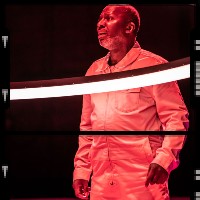Hardly any of the residents leave the island - the last was Bill (Cyril Nri,) who went off to the Second World War and returned with Christianity, declaring himself the chaplain and baptising all the locals.
More recently Bill and his wife Mill's (Jenna Russell) nephew Francis (Archie Madekwe) spent a few months in Cape Town, where he met factory owner Mr Hansen (Gerald Kyd.) Hansen has plans to open a crayfish-potting factory on the island; he's unsuccessful but doesn't get much time to get angry about it, as the mountain starts to smoke. The islanders are evacuated, and when we next see them they've been unhappily relocated to England, to work in one of Hansen's factories - their home, they've been told, has been completely destroyed.
Seeing it straight after Julius Caesar, Further than the Furthest Thing gave me the sinking feeling that the current crop of up-and-coming directors may be as heavily influenced by Yaël Farber as the last lot were by Ivo van Hove, and we could be in for a few years of slow, humourless theatre-as-ritual. Certainly Soutra Gilmour's set, which has the audience sit directly on the seating padding with no covers, surrounds the action in a way that hints at an ancient amphitheatre, while the revolve moves so imperceptibly slowly it's disorientating; and the story at the island is often accompanied by Shapla Salique's mournful singing, which is gone once the characters are dumped in industrialised England. And yes, the blood is black ink again.
I'm not sure this technique does Harris' writing any favours: The play was critically lauded when it premiered and has had successful revivals elsewhere, but here it feels particularly languid and repetitive. In the second act Russell puts in a heartbreaking performance, but crikey she has to keep it up for a long time, with a speech about the island's dark secret past that she has to drag out for what must be ten tear-streaked minutes. It might also be more effective if it wasn't part of a series of plot twists that would probably work on their own, but start to feel like heaping melodrama upon melodrama.
The events of the first act also feel largely forgotten by the second, especially a major plotline involving Francis' girlfriend Rebecca (Kirsty Rider,) pregnant by another man. It takes an incredibly bleak turn that also serves to tip the already mentally-fragile Bill further over the edge, but apart from being used to blackmail Bill later it doesn't really come up again.
All in all it's a production that left me with a lot more questions than answers, and not about the story's themes but about its construction: The play's colonial theme made me particularly question why, if the island's visits from English ships are admittedly infrequent but still such a long-standing event that the food supplies are essential, was the first encounter with Christianity in the 1940s? Similarly, some books have been making it there on the ships, how is everyone completely unfamilliar with the convept of a volcano? Harris has given the islanders an "accent" that involves adding "H" to the beginning of words, but why does Tang's production give each of them a completely different accent from different parts of the British isles? In the end these mental diversions prove more interesting than the drawn-out story on stage.
Further than the Furthest Thing by Zinnie Harris is booking until the 29th of April at the Young Vic.
Running time: 2 hours 40 minutes including interval.
Photo credit: Marc Brenner.






No comments:
Post a Comment